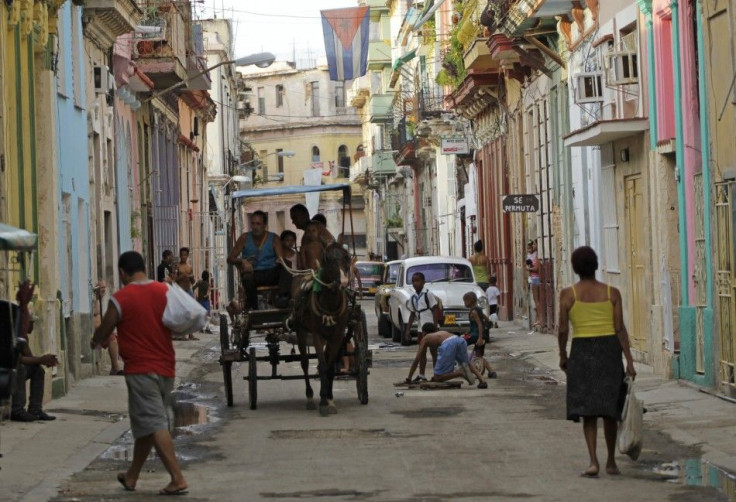US-Cuba Travel Snarled By Regulations, Politics

(Reuters) - The Obama administration's much touted "people-to-people" travel program to Cuba has all but ground to a halt due to tighter regulations issued in May, apparently to placate Cuban-American lawmakers, travel industry professionals said this week.
The program, which began last year and requires the annual renewal of permission to bring groups to Cuba, allows for educational and cultural travel under the administration's policy of constructive engagement.
The licenses of dozens of tour operators, who have carried an estimated 50,000 Americans to Cuba under the "people-to-people" banner so far, have not been renewed by the Treasury Department's Office of Foreign Assets Control.
This has caused confusion in both countries as the trips must be planned months in advance and hotel rooms, very much in demand in Havana, blocked out for the Americans.
The problems began after the new guidelines were issued, the companies said.
"We've laid off 22 people, cancelled 150 trips, and after only one year of operations we are unable to recoup our start-up costs," said Tom Popper, president of New York-based Insight Cuba.
Popper, whose nonprofit business brought some 3,000 Americans to Cuba under the program, said he had applied twice to renew his license to no avail.
"We know of many licensees that are in the same predicament," he said.
The travel program came under heavy fire from its inception from Cuban-American lawmakers, who oppose all contact with the Communist-run country and have lined up to denounce it.
SOURCE OF REVENUE
"This is not about promoting democracy and freedom in Cuba. This is nothing more than tourism ... a source of millions of dollars in the hands of the Castro government that they use to oppress the Cuban people," Republican Senator Marco Rubio of Florida charged during congressional hearings last year.
Rubio then blocked the administration's nominee for undersecretary of state for Latin American affairs, Roberta Jacobson, until it agreed in March to tighten the regulations, according to his office's statements to the media at the time.
The new regulations quickly followed.
The Obama administration has denied any deal with Rubio, saying the regulations were tightened after it heard of potential abuses of the program, which essentially prohibits typical Cuba tourist activities such as salsa dancing or going to the beach.
"We revised the license application criteria to stress to applicants the seriousness of the requirements of the people-to-people licensing program, in part because of reports we received concerning travel under the licenses," Jeff Braunger, OFAC's program manager for Cuba travel licensing, said by email.
John McAuliff, executive director for the Fund for Reconciliation and Development, an organization working to normalize U.S. relations with Cuba, as it did with Vietnam, said he doubted that was the case.
"OFAC is accommodating Senator Rubio and other hard liners who oppose all travel because it undermines their narrative about isolating evil Cuba," McAuliff said.
Hopes for a significant improvement in relations when Obama took office were soon dashed when Cuba arrested U.S. contractor Alan Gross in December 2009 for illegally bringing internet equipment into the country and setting up Wi-Fi networks. He was later sentenced to 15 years in prison.
Since then hostile rhetoric between Washington and Havana has picked up and immigration and mail service talks have once more been put on hold.
CLARITY OR OBFUSCATION
The United States banned travel to Cuba under sanctions put in place soon after the 1959 Revolution, but has gone back and forth ever since on whether Cuban Americans and professionals should visit the "enemy" 90 miles (145 km) away.
Obama lifted all restrictions on Cuban Americans visiting home, and in December 2010 reversed a Bush administration ban on professional research, religious and people-to-people travel.
An estimated 350,000 to 400,000 Americans visited Cuba in 2011, the vast majority of Cuban heritage.
The new regulations require detailed itineraries of each travelling group, reports upon their return and explanations about each member's "meaningful interchange" with ordinary Cubans.
Applications can now run more than 100 pages, compared with fewer than 10 pages in the past.
Bob Guild, vice president of Marazul Charters, said the new regulations, while far more onerous than those issued when the program began, lacked the very transparency Braunger said they provided.
"What do they mean by such phrases as you must demonstrate travellers' 'meaningful interchange' with Cubans during each of four activities, each day of the trip, and then give the result of that 'meaningful interchange?'" asked Guild, in Havana this week to sort out hotel reservations for clients left waiting for licenses.
"When a group thinks they have complied with the restrictions in the applications, and we're talking now about some of the most prestigious groups in the United States such as the Smithsonian Institute and National Geographic, Treasury says no, we need more," Guild told Reuters.
"What more do you need, the organizations ask, and OFAC says 'we can't tell you that but we need more,'" he said. (Additional reporting by Jeff Franks; editing by Mohammad Zargham)
© Copyright Thomson Reuters 2024. All rights reserved.












